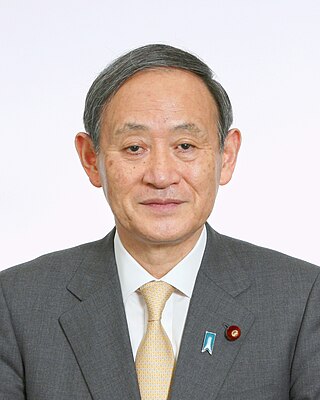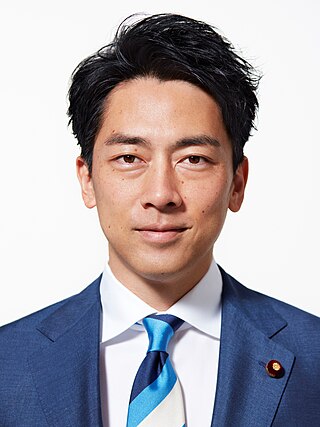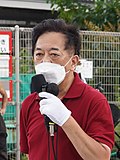
The politics of Japan are conducted in a framework of a dominant-party bicameral parliamentary representative democratic constitutional monarchy. A hereditary monarch, currently Emperor Naruhito, serves as head of state while the Prime Minister of Japan, currently Shigeru Ishiba since 2024, serves as the elected head of government.

The Liberal Democratic Party, frequently abbreviated to LDP or Jimintō (自民党), is a major conservative and nationalist political party in Japan. Since its foundation in 1955, the LDP has been in power almost continuously—a period called the 1955 System—except between 1993 and 1994, and again from 2009 to 2012.

Yoshihide Suga is a Japanese politician who served as Prime Minister of Japan and president of the Liberal Democratic Party (LDP) from 2020 to 2021. He had served as Chief Cabinet Secretary during the second administration of Prime Minister Shinzo Abe from 2012 to 2020. During Abe's first administration, Suga served as Minister for Internal Affairs and Communications from 2006 to 2007.

Sanae Takaichi is a Japanese politician who served as the Minister of State for Economic Security from 2022 to 2024. A member of the Liberal Democratic Party, she has served in the House of Representatives since 2005, and had also served in several ministerial posts under Prime Minister Shinzo Abe. In 2021, she was a candidate in the Liberal Democratic Party leadership election, but was ultimately eliminated prior to the runoff, placing third. Takaichi made her second run for the LDP leadership in 2024, where she came in first in the first round but narrowly lost in a runoff to Shigeru Ishiba.

Hiroshi Moriyama is a Japanese politician who has served as Secretary-General of the Liberal Democratic Party since 2024. He previously served as Minister of Agriculture, Forestry and Fisheries from 2015 to 2016. He was a member of the House of Councillors from 1998 to 2004 and has been a member of the House of Representatives since 2004.

Hachiro Okonogi is a former Japanese politician who has served in the House of Representatives representing Kanagawa Prefecture. He also served in the Cabinet as Chairperson of the National Public Safety Commission, Minister in charge of Building National Resilience, and Minister of State for Disaster Management from 2017 to 2018. He is a member of the Liberal Democratic Party.

General elections were held in Japan on August 30, 2009 to elect the 480 members of the House of Representatives. The opposition Democratic Party of Japan (DPJ) defeated the ruling coalition in a landslide, winning 221 of the 300 constituency seats and receiving 42.4% of the proportional block votes for another 87 seats, a total of 308 seats to only 119 for the LDP.
In Japan, most forms of gambling are generally banned by the Criminal Code chapter 23. However, there are several exceptions, including betting on horse racing and certain motor sports.

House of Councillors elections were held in Japan on July 11, 2010. In the previous elections in 2007 the Liberal Democratic Party (LDP) had lost its majority to the Democratic Party (DPJ), which managed to gain the largest margin since its formation in 1996. The House of Councillors is elected by halves to six-year terms. The seats up for election in 2010 were last contested in the 2004 election.

Shinjirō Koizumi is a Japanese politician who served as the Minister of the Environment from September 2019 to October 2021. He also serves as a Member of the House of Representatives for the Liberal Democratic Party. He is the second son of former Prime Minister Junichiro Koizumi and the younger brother of actor Kotaro Koizumi.
Events in the year 2012 in Japan.

Kanagawa 1st district is a single-member constituency of the House of Representatives, the lower house of the national Diet of Japan. It is located in eastern Kanagawa Prefecture and covers the central downtown and southeastern parts of the prefectural capital of Yokohama, namely the Naka (centre), Isogo and Kanazawa wards. It is among many other things home to the Yokohama city hall and the Kanagawa prefectural government building. As of December 1, 2020, 428,115 eligible voters were registered in the district.

General elections were held in Japan on 22 October 2017. Voting took place in all Representatives constituencies of Japan – 289 single-member districts and eleven proportional blocks – in order to appoint all 465 members of the House of Representatives, the lower house of the then 707-member bicameral National Diet of Japan. Incumbent Prime Minister Shinzō Abe's governing coalition of the Liberal Democratic Party (LDP) and the Komeito party retained their seats in signs of what was perceived as weak opposition. Abe won his fourth term in office and held on to the two-thirds supermajority in order to implement policies on revising the war-renouncing Article 9 of the Japanese Constitution.
The first stage of the 18th unified local elections in Japan took place on April 12, 2015. The Liberal Democratic Party under leadership of Shinzo Abe was the overall victor, winning many races including all ten gubernatorial races and 1,153 of the 2,284 assembly seats at stake. Further elections for municipal mayors and assemblies took place on April 26.

General elections were held in Japan on 31 October 2021, as required by the constitution. Voting took place in all constituencies in order to elect members to the House of Representatives, the lower house of the National Diet. As the constitution requires the cabinet to resign in the first Diet session after a general election, the elections will also lead to a new election for Prime Minister in the Diet, and the appointment of a new cabinet, although ministers may be re-appointed. The election was the first general election of the Reiwa era.

Prefectural elections for the Tokyo Metropolitan Assembly were held on 4 July 2021. The 127 members were elected in forty-two electoral districts, seven returning single members elected by first-past-the-post, and thirty-five returning multiple members under single non-transferable vote. Two districts had their magnitude adjusted in this election to match population changes.

Takeharu Yamanaka is a Japanese politician and current mayor of Yokohama, the capital of Kanagawa Prefecture. He defeated incumbent mayor Fumiko Hayashi in the 2021 Yokohama mayoral election. His independent campaign was supported by the Constitutional Democratic Party, Social Democratic Party, and the Communist Party of Japan. Yamanaka's campaign focused on the opposition for a planned integrated resort development and casino for the city which was to be built on Yamashita Pier, criticism against the government's response to the COVID-19 pandemic, and additional sister city relationship with San Francisco, California.

The 2021 Liberal Democratic Party presidential election was held on 29 September 2021 to elect the next President of the Liberal Democratic Party of Japan and Prime Minister of Japan. Fumio Kishida was elected to lead the party and assumed the premiership on 4 October. He led the party into the 2021 Japanese general election.

The president of the Liberal Democratic Party is the highest position within Japan's Liberal Democratic Party. The current holder of the position is Prime Minister of Japan, Shigeru Ishiba, who was elected to the position on 27 September 2024, following his victory in the party's presidential election. The previous leader, Fumio Kishida announced his resignation on 14 August 2024, thereby not seeking reelection.






















